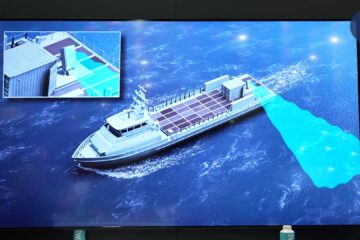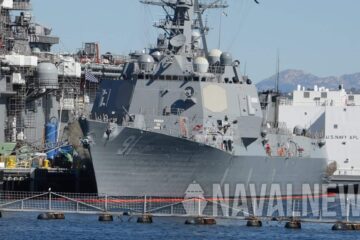NAVAIR press release
“Aircraft E322 will leave Boeing’s production line and head straight to Strike Fighter Squadron (VFA) 34 based in [Naval Air Station] Oceana,” explained Cmdr. Tyler Tennille, of Defense Contract Management Agency (DCMA), who oversees Acceptance Testing.
“When the Super Hornets first came online, they were a game changer,” he explained, pointing to the Block II’s Active Electronically Scanned Array (AESA) radar as well as larger displays, upgraded sensors and avionics, and increased range and capability to employ an arsenal of precision weapons that delivered advanced lethality and mission flexibility for the service.
The robust airframe was built with an open mission systems architecture, which has enabled easy integration of new weapons and technologies. The Block II Super Hornet serves as the Navy’s responsive aircraft, fully capable across the full mission spectrum which includes: air superiority, fighter escort, reconnaissance, aerial refueling, close air support, air defense suppression, and day/night precision strike.
This aircraft has stood strong as the backbone of the Navy’s carrier air wing, and has proven itself repeatedly during numerous operations where it has been the preeminent platform performing multiple missions, sometimes rapidly reconfiguring on the fly.
Even though it is substantially larger – roughly 7,000 pounds heavier and a 50 percent higher range, the Super Hornet delivered with fewer parts and lower maintenance demands than its predecessor, the Hornet.
“Delivery of this last production Block II Super Hornet is hardly the end of an era, but rather a stepping stone along the path to continuously evolving our platforms to meet the Navy’s ever-evolving needs”
Capt. Jason Denney, Program Manager of the F/A-18 and EA-18 Program Office (PMA-265).
“Block III delivery is just steps behind and the production lines won’t miss a beat, with the first two U.S. Navy Block III test jets delivering in the next two months, followed by delivery of 24 E/F aircraft over the next year for our international customer, Kuwait,” Denney said.
Following the delivery of these aircraft, Tennille said he expects the transition from Block IIs to Block IIIs to be seamless.
The proven capabilities and successes of the Block II program were leveraged by the Navy in awarding a multi-year procurement contract for Block III Super Hornets to Boeing in March 2019, totaling approximately $4 billion. The Navy will procure 72 Block III Super Hornet aircraft between fiscal years 2019 and 2021, while realizing more efficient production rates and providing the supporting industrial base with stability and advantages in production and spares planning.
Boeing is expected to deliver the Block III test jets to the Navy as early as late spring, where subsequent testing will commence at both NAS Patuxent River and Naval Air Weapons System (NAWS) China Lake. This latest version of the Super Hornet includes an advanced cockpit system; advanced network infrastructure; reduced radar cross-section; and a 10,000-flight hour lifespan.
“Though we’ve done tremendous work to meet readiness requirements, we know continual forward momentum is needed to sustain that readiness while maintaining our tactical advantage to be more lethal and survivable than our potential adversaries,” said Denney. “The solid partnership with Boeing for the Block III production and modification programs ensures the Super Hornet will remain not only relevant, but ready to fight in today’s dynamic global environment and well into the future.”







One Comment
Pingback : Dernier Super Hornet Block II réceptionné par l’US Navy | LF5422 Micheville